Subscribe Apple | Google | Spotify | Stitcher | iHeart Living the Dream Overseas with Christine Gritmon Have you had a lifelong dream to live overseas and haven't made that happen yet? Maybe things have gotten in the way like family, jobs, life. My...
Ep161 Transcript: Interview with Paul Zolman
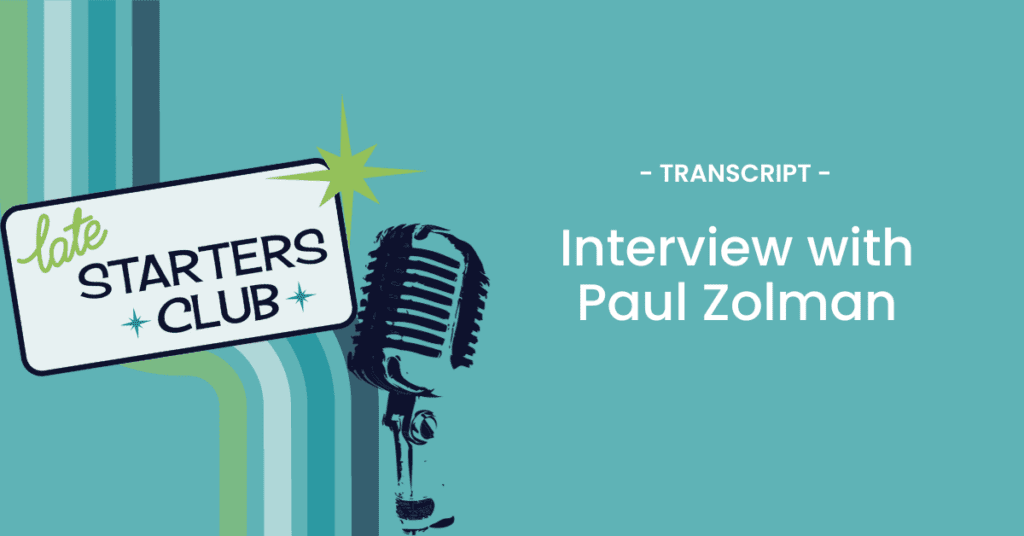
Andrea Vahl: What if you are late in being able to show love in a deeper way? My guest today, Paul Zolman, grew up with a background of anger in his family. And so after his divorce, he developed a game based on the five love languages in order to help him to express love more fully. Tune in to today’s episode.
Hello, dreamers. Welcome to the late starters club, giving you the inspiration, mindset, and tools you need to start something midlife and beyond remember, it’s never too late to follow your dreams.
Late starters. It’s your host, Andrea Vahl. And I am here with Paul Zolman, who has a really fascinating background. And I’m super excited. He is a late starter in lots of different ways. But his latest business which is what we’ll dive into a little bit was what really connected us and got me interested about telling his story.
So let me just introduce you, Paul. So Paul is a love linguist and he knows all the love languages and how to give them away and has the ability to see them coming his way. And you can too. So we’ll talk about what that all means. But welcome Paul.
Paul Zolman: Thank you, Andrea. Pleasure to be with you today.
Andrea Vahl: Yeah, super fun. And I’m a big, I’m a big love language fan. I really definitely think that it’s a super important thing that it has come out in the recent years, but talk about what you do and like the way you do it with adding into the love languages and with your product that you invented.
Paul Zolman: So just a few years ago in 2017, I started the development a little bit earlier, but in 2017, I received a copyright for this cube.
On the cube, it has the different love languages there. You can see a person holding a platter that represents service, two hands together, making a heart with a conversation fly out from that, those are the words from the heart. There’s a hand holding an hourglass, that represents time, a hand holding a gift, that’s gifts, and then two hands touching one another, that would represent that touch. So there’s five love languages, six sides on the cube. This one surprised me.
So there’s just two instructions. You roll the cube every day. That’s the love language you practice giving away all day that day.
So Andrea, part of the backstory is that I came from a background of anger. And I didn’t know how to love, so I had to figure this out. But this really helped me focus on learning all five love languages.
Every day it’s going to be a little bit different, but over a 30 day period, you’ll see and be able to give away all five love languages. When you do that, that really gives you peripheral vision, so you can see it when it’s coming your way. It may not be your primary love language, but you can respond appropriately to that.
Andrea Vahl: Yeah. So it’s almost like you’re a late starter to Showing love in a different way, in a new way, maybe.
Paul Zolman: Exactly. Exactly. Yeah,
Andrea Vahl: Yeah. And actually let’s back up for people who may not be familiar. I know that’s it’s definitely something that a lot of people are familiar with, but it’s originally a book that, was it Gary Chapman?
I’m, yes. Gary Chapman wrote called the five love languages.
Paul Zolman: Correct.
Andrea Vahl: And so where did you like, so you read the book and then you thought, what was the thought process for inventing this? What, where did this come about? Cause you weren’t in this realm. You were, you had a totally different background.
Paul Zolman: I come from a financial background of doing accounting and finance. And no, it’s definitely not my background. But what it came from was I had, I was had an abusive childhood and angry family. And what I realized is that I was learning anger and being trained to be angry from the very start of my life.
We get what our parents passed down to us, and I was passed down anger, and a lot of that became residual anger from my childhood, into adulthood. And I wanted to turn that around. I kept blaming my father up to about age 35. I was blaming my father for all the awkwardness. It was like every time I became angry, obviously repel people, my family and others.
And if you get angry in public who wants to be close to that person, you have that repelling value there. If that’s even called a value. And I did not want that. It happened with my family and I’m sure it was contributory to the demise of my first marriage as well after 23 and a half years. But I didn’t want that in my life anymore.
And so I started reading books about that, read The Color Code and The Five Love Languages. I went through the books but because of my background, It the books didn’t really resonate with me.
You mean Dr. Chapman that if I if I guess what Andrea’s love language is and if I cater to that Andrea and I are gonna be buddies.
I’m a terrible guesser. It wasn’t working for me That, that, that shotgun approach just absolutely was not working for me. So I went to Dr. Chapman’s other application, which is that if I take this test, this survey, and if I find, I can find out what my love language is. What am I supposed to do with that?
What do I do? Advertise? Hello, Andrea. I’m gifts. What do you have for me today? How’s that supposed to work? even if I did tell Andrea what my love language is, and then I said I told you what my love language is. How come you’re not doing it? You get to that pity party, I’m sure that was absolutely unintended by Dr. Chapman, the creating this pity party, because that’s the communication. I thought, there’s got to be a better way. So I thought, I liked games, and I think even in my dysfunctional family growing up. Games brought us together. There was still a smack talk. There was still a putdowns. There was still all the competition, but it brought us together.
So I contacted Dr. Chapman and said “Dr. Chapman, are you licensing those little icons a little pictures you have for each one of those love languages?” This attorney wrote me back said no, we’re not doing that at this time. So I had an attorney friend that was in the copyright sector in the intellectual law sector of the, of law, and took this idea to him, he said, theory, like the love language theory is not copyrightable, application is, so they weren’t doing it as a game, so I felt it would be fine for me to make my own icons, since I couldn’t license them, make my own icons, and then put it on the cube, and that’s what I did.
Now on the cube, you’ll notice that there are no words at all.
Andrea Vahl: Huh.
Paul Zolman: It’s intentional like that because it could be something that go international, but also for children. Children start reading. When they start reading. With the pictures, they can tell the story by the pictures. And this is something that can be applicable to children as well.
So that’s how I got to where I’m at right now.
Andrea Vahl: Yeah. Yeah. And I think I, I love that too, because it’s not like just if you have one main love language, it’s like You not saying that, Hey I never want any gifts ever. I like that. I like that you can, choose to give something away or make one of them a focus each day, so that you really hit multiple things. But yeah, there’s part of me that does think I should go around with a little button that says my love language is touch, just give me a hug. I just want to hug. Okay.
Paul Zolman: You gave me some great marketing idea, Andrea. I’ve been looking for other products. I like that.
Andrea Vahl: Yeah. Yeah. So that’s amazing. So I love that. I love that whole concept. I think it could be applied to so many different things and just make our relationships better, right? That’s what is the spice of life is just really connecting and being able to connect to each other.
We were also talking a little bit before we started about the way you’ve late started into a few different things, this, game being one of the things, but also you were talking about how you you just got your degree at age 42, right?
And you hadn’t had a college degree at all before that. Had you been to college before? Or what was the idea behind like really wanting to get back to college if you had done other things in your career?
Paul Zolman: Mostly it was for income purposes just to elevate income. You can only get so far without a college degree in any position, any job position. Maybe that’s true. Maybe it’s not. Take a look at Bill Gates. It didn’t that. Yeah. And others that have dropped out of college and where they’re at right now.
But I wasn’t doing self employment up until that time, and I was doing mostly employment with other people, and they required the college degree for that. And to get anywhere in that situation, I needed a college degree. By the time I got my college degree, I was already a CFO of a public company. So I needed the college degree for the resume for that public company, because normally you don’t see a CFO without a college degree, and so I needed to get it for that purpose, and so it was a late bloomer Andrea, and there’s a lot of things, I feel like I’m in my 40s and there’s a lot of life left, and a lot of things left to do.
And one thing about love, though, and about this is that I realized that I created this when I was single. I don’t know if I mentioned that. I don’t think I’ve mentioned that yet. But I created it when I was single, because after I was divorced, I needed to improve myself. I really, I’m a believer and a Christian, and I believe in the words that Jesus said at the Last Supper that one of them, one of the disciples was going to betray him.
Each one of the disciples said, Lord, is it I? And as I’ve incorporated that sentence into my prayers and into the way I look at myself, that introspection, I’ve realized that there’s a lot of things that I’m the cause or the problem with. And I really need to either move out of the way. Or get in the way or and really pursue the solution of problems.
And one of those problems for me was the anger. I started looking at people and realized that what was causing the anger that I would be annoyed. And be annoyed and be annoyed and be stacking these annoyances until I had that flash of anger come out. And I thought I was very patient in being annoyed because I do it like the sixth or seventh annoyance.
I’m not the first one. So I thought I was being great. I’m really a good angry guy. And just, just you try to whitewash it, however it does, and it still doesn’t work. You have all these excuses, or you blame someone else. When you blame someone, I found out, Andrea you don’t have to change. It’s their fault.
Them that has to change. And if you have that blame or that victim mentality that it’s their fault, then you’re not going to change because it’s their fault. You’re not moving anywhere on the spectrum. So what I realized my spectrum was that I’ve got anger on one side and I’ve got love on the other side.
And I’m on the angry side. And what really pronounced that is when after that, the demise of my first marriage, I started dating. And it got serious, so I took this woman for big brother approval. Now, I’m number 10 of 11 children. I have to have big brother approval. It’s just part of the deal. And as I go in my brother’s house, my sister in law pulls her aside and with an earshot says, The only emotion that the Zolman family learned growing up was anger.
First I did not, I said, then it made me mad. I was like, I’m totally busted. And so that, that was really the turning point for me, that I really needed to figure this out. And I started saying things to myself like, I don’t want to be angry. A double negative sentence because that’s, that came from an angry background.
They’re not very positive people. If you’re angry, you’re not positive. You’re just being angry. And that double negative didn’t work obviously. Double negatives work in math. You multiply two negative numbers together, it becomes positive. It doesn’t work in relationships. I realized that.
I figured, I’ve got to find a replacement behavior. And that’s where the cube came in. That replacement behavior. All my paradigm shift was now what’s right about that person. What can I love about that person instead of what’s wrong with that person and going down that critical path. So it’s just an 180 degree shift from that annoyance.
That first annoyance. First, I’m looking and I’m looking at somebody else’s lane. Thinking I have control over what they’re doing and I realized I don’t. I can’t make their choices for them. I can’t change the outcome. I can encourage, I can ask them if they’d like some advice, but I really can’t change the outcome for them.
Unless they ask for advice or they give permission for me to give advice. I can’t, I gotta stay in my lane. And I realized that and that’s something, a late bloomer type of thing that I’ve done. Something that really has taken, a long time to start doing that, start staying in my own lane.
But as I’ve done it, I’ve realized that, and rolled the cube. I can learn all these love languages, and I’m watching for people that light up. When they light up, that’s the way I discover their love language. No longer do I have to go through what I went through. Take, have them take, pause the relationship.
Could you take this survey so I can figure out how to love you? No, it’s awkward. We don’t have to, don’t have to do awkward anymore. You use your observation skills, and then when they light up, that’s what they like. That’s their primary or secondary love language. It’s one of the top love languages when they light up.
And so that’s what we’re dealing with. We want to continue to send that out. It gives variety. Every day, it’s the genre of love that I’m sending out is different. You’re sending it out without any expectation of it coming back, but trusting the universe, the laws of the universe, the law of the harvest, karma, law of attraction, whatever you want to call it, that it’s coming back someday.
Andrea Vahl: Yeah, I love that. And I think it’s definitely hard to be angry at someone when you’re thinking of ways to love them, like how to show them love. I think it’s hard when you’re really diving into the positive qualities that they have and ways that you can show them love. It’s hard to be angry.
So that’s great. Yeah. Yeah. And I love that. I love that you were getting angry about being angry.
Paul Zolman: It lit the fire. It definitely lit the fire.
Andrea Vahl: So that, that is awesome. So then what was it like, what was the process like, so you have this, you’re reading the books, you have this idea for something, a way to gamify this. What was it like to then take that idea to action? Did you have to find a manufacturer to, it’s the nice thing is it’s.
It’s pretty simple. It’s just the, it’s the dice or whatever, or the die dice die. I can’t remember what it’s, what’s the, it’s the cube. Let’s call it the cube.
Paul Zolman: For a long time, Andrea, I’ve been calling it a die and people don’t like that word for some reason.
Andrea Vahl: No, I know it. doesn’t sound good. I’m going to, yeah, here, have a die,
Paul Zolman: Sounds a little bit morbid. Yeah,
Andrea Vahl: so we’ll call it a cube. Have you ever done anything like this before where had a game or had an idea that you had to go find a manufacturer for that?
Paul Zolman: I have actually, and I started in 1994. I started a Christmas ornament business. And that Christmas ornament, I made it outta wood, but I had to find some, someone to do the artwork. And it was looked like the three dimensional, but it was really a two dimensional made out of wood, and it was more rustic.
I, I had to figure out what the different collections to do. And I ended up with 450 designs, sold that company and traded that company actually for a 70 acre farm in Colorado. I sold the farm and launching, launching some other things, but I always wanted to own the farm. I grew up in Montana and in Montana, everybody, if you say you’re from Montana, everybody thinks you can ride horses.
One, one time I moved out of Montana when I was 17 and then moved in with my brother and he was transferred to California. And I started dating in California, my senior year of high school. And this girl had a horse. She heard, I was from Montana. And I’ve seen a lot of John Wayne movies and everything.
So she invited me over. We’re having a horse ride. We’re having a date. And so I grabbed the saddle horn, just like John Wayne, throw my leg up and over. I landed on the other side of the horse, Andrea, on my rear. And it hurt bad. She was laughing her head off. It was just funny, all the perceptions we have.
But that’s, anyway, that’s just different. I, so for the die. I did have an artist do the artwork for that.
Andrea Vahl: Mm hmm,
Paul Zolman: And from that, it took almost a couple of years to get all the art just right, just exactly right, so that when you look at the icon on the cube, when you look at it, you know what love language that is.
I didn’t want there to be any question what the love language would be. And that took a little bit to figure out what am I going to do with the sixth side on the die? Once I had all the artwork done, then I was shopping around for dice manufacturers, I shopped all across the United States. And then I found a dice manufacturer in Poland, actually.
I know the Polish are very known for their intricate ceramics and their artisan work on that type of thing. And I thought, I’m going to try this in Poland. Manufacturing the dice in Poland versus the United States, it was one third of the cost. Including tariffs and the shipping.
Andrea Vahl: wow,
Paul Zolman: one third of the cost and it’s a really cool. It’s one inch approximately one inch by one inch. Of course, they have the metrics on it, but it’s one inch by one inch and
Andrea Vahl: mm hmm,
Paul Zolman: the designs are perfect. A lot of this. They had to hand etch it. And so just even with that handiwork is still the cost is unbelievably a lot less than any manufacturer here.
Yeah.
Andrea Vahl: And so that’s really interesting that the process from idea to actually having it in your hand, took a number of years then,
Paul Zolman: It took a few years. Mostly the artwork took the longest time. So while I’m waiting for the artwork come, I built this huge one. This is two and a half inches by two and a half inches. It’s out of a block of wood. And I’m trying to roll this and because it had the sharp corners, it wasn’t rolling was just doing it.
So I’ve never made it made a cube or a die in my life, never made anything like that. So I figured out I had to round off the corners and just and make it. So it wasn’t so sharp. So it actually would roll because it would be like a weighted dice. If I wanted physical touch, all I had to do was just set it just right.
Always wrote the physical touch and. There was an attorney here in town that I showed this dye to and he said, I want a dye that has all six sides physical touch because that’s what he wanted to give away. That’s what he wanted. He wanted to receive that. And I really defy that, that teaching that Dr Chapman has.
That if you give away what you like, then it’ll come back to you. I don’t believe in that reciprocity because that, to me, is a transaction. And transactions are business. That’s not love. It’s different. It’s totally different. If you’re looking for reciprocity, you’re really looking for the wrong thing.
True love is sending it out without any expectation that it’s coming back, but trusting the laws of the universe that it’s going to come back at some point in time. I’ll be doing the transactions because it’s not. Let’s make a deal. That’s not going to work for you.
Andrea Vahl: Yeah. Yeah. Yeah. Yeah. That’s really interesting. And part of your part of your mission here is getting people to learn all five love languages. What do you think are the benefits of that? Like what?
Paul Zolman: It really improves your consistency in sending love out. Number one. The second thing is that it improves your vision. So you can see it when it comes back at you. It’s going to improve those communication skills in any sector, whether it’s. Whether it’s in work or at home or at play, any place you go, as I mentioned, I was single when I created this.
I didn’t have a significant other to practice love languages on or to cater to them at the particular time. So what the heck am I supposed to do? Then I realized, oh, I’ve got to love everyone. But it was perfect for me because it developed a character. I needed that character evolvement.
from that anger that I had. I needed that late start in sending out love. All from where I came from. It had to happen that way. And thankfully it happened that way. This actually gives gets you into a mode of watching for the best part of people and people are intrinsically good. There really are 80 to 90 percent of people of each person have good things about them.
Everybody has faults. Everybody has weaknesses. Everybody makes mistakes. Why are we focusing on that when there were? Why don’t we focus on the 80 percent that they do right? And that’s what this is all about.
Andrea Vahl: Yeah. Yeah. I love that. And now you are in a relationship. Was it the, so was it the cube that the cube did it for it helped you, huh?
Paul Zolman: know what I think that it really helped a lot because I was a different person instead of focusing on faults of another person or whoever I was dating instead of watching for red flags, you’re going to see him. Everybody has red flags. Why were you watch for red flags? Watch for the green flags and then just acknowledge.
You can say, I see that. But I don’t have to deal with that or that’s something I’m accepting of that red flag. I’ve got red flags, but I was watching for those green flags. And then that is what helped me develop the relationship and really kept strong. My wife doesn’t roll the die. I have to make that disclosure.
But what she does is she tries to guess what I’m doing that day. She’s trying to guess what I’ve rolled for the day. And by doing that, she’s participating. But just more on a, on our own level.
Andrea Vahl: That, that makes it a fun game to guess. Yeah. That’s right. That’s right. It’s awesome. Awesome. So do you have any advice for, developing this now? So you were doing this, were you doing this on this side? Cause you’ve had a lot of different things going on. Are we doing, were you developing this on the side?
I’m guessing while you were. other things as well.
Paul Zolman: Yes, for the last 13 years or so I’ve been doing merchant services. I set up businesses so they can take credit cards as payment. That still really funds my my avocations, my habits. It really helps keep the threshold
Andrea Vahl: I love that. I love that this is something that you’re passionate about. You decided to start, you started, went through the process of Developing it, getting the artwork, getting it manufactured, researching manufacturers. And so what advice would you have for anyone who is looking to do something like that?
Maybe it’s a game, maybe it’s starting a product, maybe it’s a special Christmas ornament idea that they have. What advice would you give for anyone who is looking to start something like this, like a physical product?
Paul Zolman: That’s a great question, Andrea, and I’m going to answer it this way. I used to be annoyed annoyed, but I realized that those annoyances actually could be launch pads for ways to solve problems, a way to launch a business that would solve that problem of maybe that person’s problem, or maybe several people’s problem, or maybe your own problem like this was for me, this really solved the problem, anger for me, That I wasn’t starting to stack those annoyances anymore.
In fact, I rarely get annoyed anymore, because what I’m watching for is opportunities to love. Now, instead of stacking annoyances, I stack kindness on kindness. And this became the launchpad for being able to get to the higher laws of love. compassion, the laws of charity, the law of forgiveness, intimacy, empathy, or sympathy, anything like that, it gets to these, this, these are stair steps now to the higher law.
So I think what you’re watching for and what your listeners should watch for opportunities is where there’s Kind of a clog in the system, something that is annoying to someone, annoying to yourself, that you can solve a problem with. This became that for me, and I would suggest use those annoyances.
In that way, launch a business, try to solve the problem or watch for inspiration of how can I solve that problem or how can I help that person? And when you’re trying to help people, then it’s a whole lot easier, I think, to get passionate about how, especially when you find something that really does help, like this did for me, it’s easy to be passionate about it as well.
Andrea Vahl: Yeah. I love that because you’re not like, Hey, how can I go out and make a bunch of money on this thing? It’s how can I be of service to something that I see that is wrong that I need or that I see that actually it could be like, if you’re launching something that could be a service to a group of people, it’s coming from that place of service will help you probably Break down the barriers that come up when you have to, go to a lot of different manufacturers or find the artwork or get the something, whatever designed quite right.
So I love that if you’ve got a different motive that can help you be resilient in the face of obstacles.
Paul Zolman: Absolutely. You need that. It can’t be just about the money. Money is the result, money comes to great ideas. So it can’t be about the money, it has to have that underlying purpose, as you said, Andrea, that is going to sustain you through those, through the rough times too.
Andrea Vahl: Yeah. Yeah. This has been awesome, Paul. Thank you, so much for sharing your your ideas and how you got your late start in developing the love languages and showing love and in different ways. I love that. I, one thing I always like to ask. All of my guests is a favorite motivational quote or inspirational saying that carries you through.
I just am such a quote junkie that I love to hear what inspires you.
Paul Zolman: Thank you, I appreciate that, and I do have a very favorite quote, Andrea, and it comes from the classic movie, Sound of Music. Rolf is on the ground and. The Von Trapp daughter is up on the second story, he starts singing a song, and some of the lyrics of this song are Love in the heart wasn’t put there to stay.
Love isn’t love till it’s given away.
Andrea Vahl: Wow. I love that. That’s awesome. And this is another reason I love it because everyone has something so unique and I hadn’t even ever heard that before. And I just, that’s beautiful. And where can people find you online? We’ll have all these, we’ll have all the links to your the the role of love book, the journal, all kinds of things that you have available, but tell us where people can connect with you online.
Paul Zolman: That’s a great question, Andrea. The best way to connect with me online is through my website roleoflove. com R O L E O V E dot com and I’ve got a bundles special right now that you can get the cube the book and the journal For just 29. 99, and it’s a great gift, great wedding gift for a family starting out, it’s a perfect wedding gift for Christmas, it’s a great gift for someone that, that you feel like might enjoy something like this, they won’t have to wear that badge that says, My Love Language is around.
Unless you want to do gifts. My love language is gifts. That would be a great one to do.
Andrea Vahl: That’s awesome.
Paul Zolman: Or you wouldn’t want to do physical touch because they might punch you or something, oh yeah, I’m gonna touch that guy. But this bundle package is a whole lot less than just one therapy session with your therapist.
Andrea Vahl: Yeah, I love that. So yes, we’ll have the links in the show notes, but thank you so much Paul for coming on and sharing your journey with us.
Paul Zolman: My pleasure, Andrea.
Andrea Vahl: Bye everyone.
Hope that was helpful and make sure you grab the free guide top tools for late starters on the website at late starters club. com and let’s turn dreaming into doing.
Join the conversation.
Let us know what you think about this episode.
Never miss an episode.
Subscribe to the podcast
You may also enjoy…
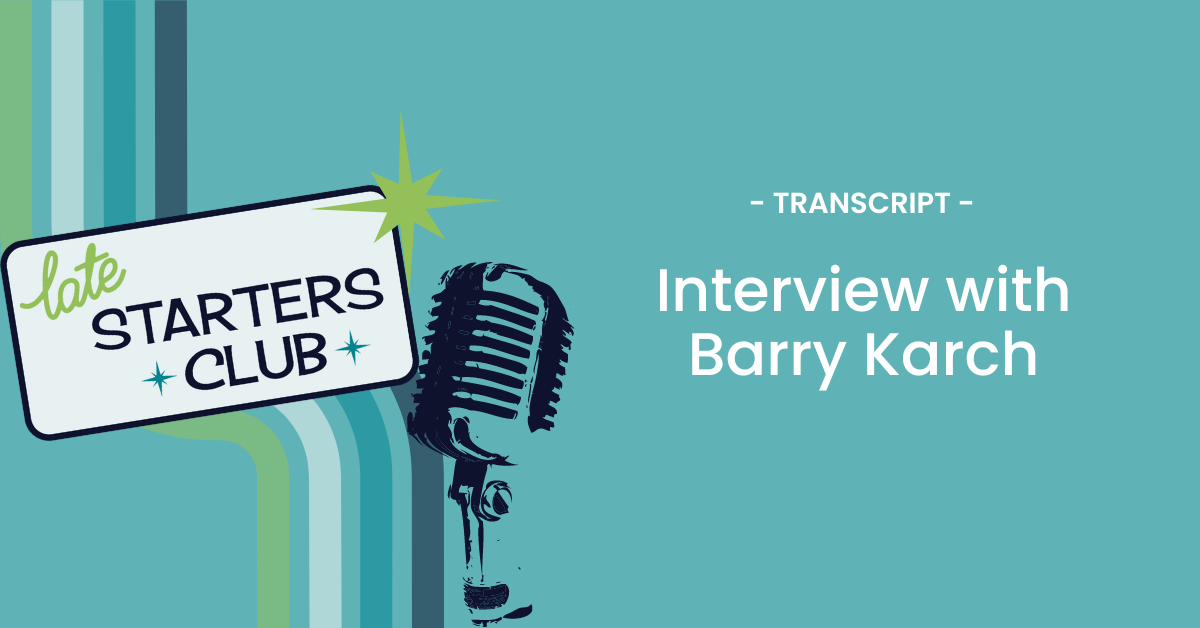
Ep170 Transcript: Finding New Motivation with Barry Karch
Finding New Motivation with Barry Karch Andrea Vahl: It's never too late to restart something you loved. My guest today, Barry Karch, started training for a marathon after a 20 year hiatus. And we'll also dive into how he climbed the equivalent of Mount Everest...
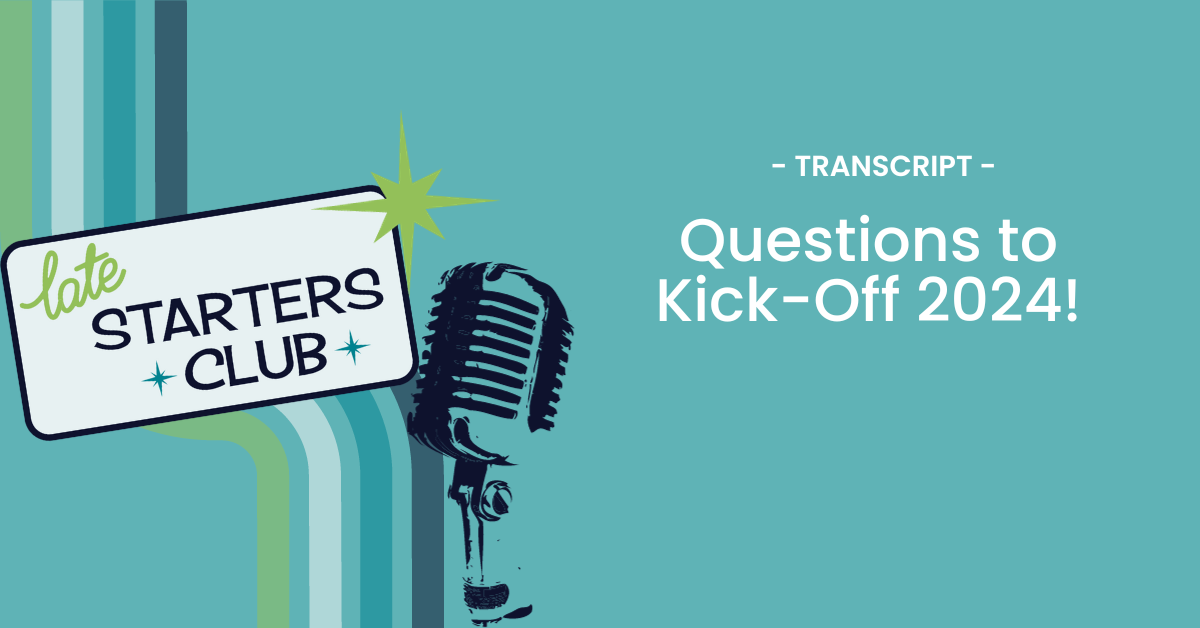
Ep169 Transcript: Questions to Kick Start 2024
Andrea Vahl: Oh, happy new year. Yeehaw. 2024. All right. I don't know about you, but I love planning out my year and setting goals and really reflecting on how my past year went and being super intentional about what I want the next year to look like. In today's...
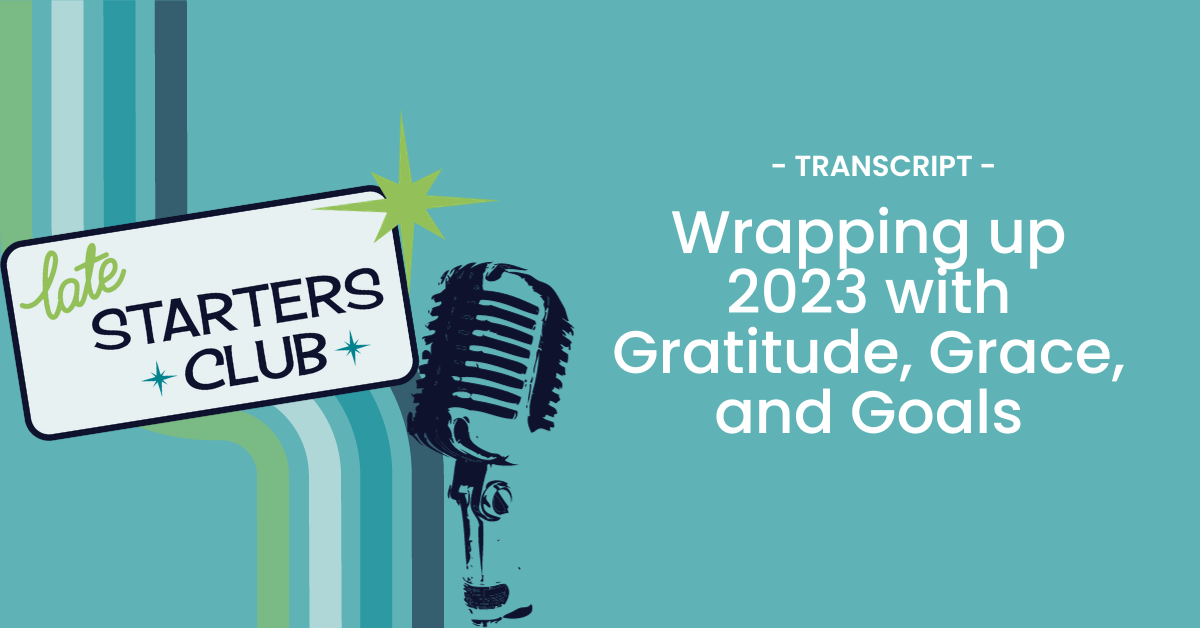
Ep168 Transcript: Wrapping up 2023 with Gratitude, Grace, and Goals
Hello, late starters. It's your host, Andrea Vahl And today is Christmas day. And if you do celebrate that Merry Christmas, if you celebrate some other holiday, I wish you all the best and all the joy for that. I just wanted to make a different episode. So today we're...
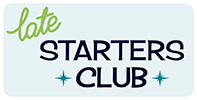
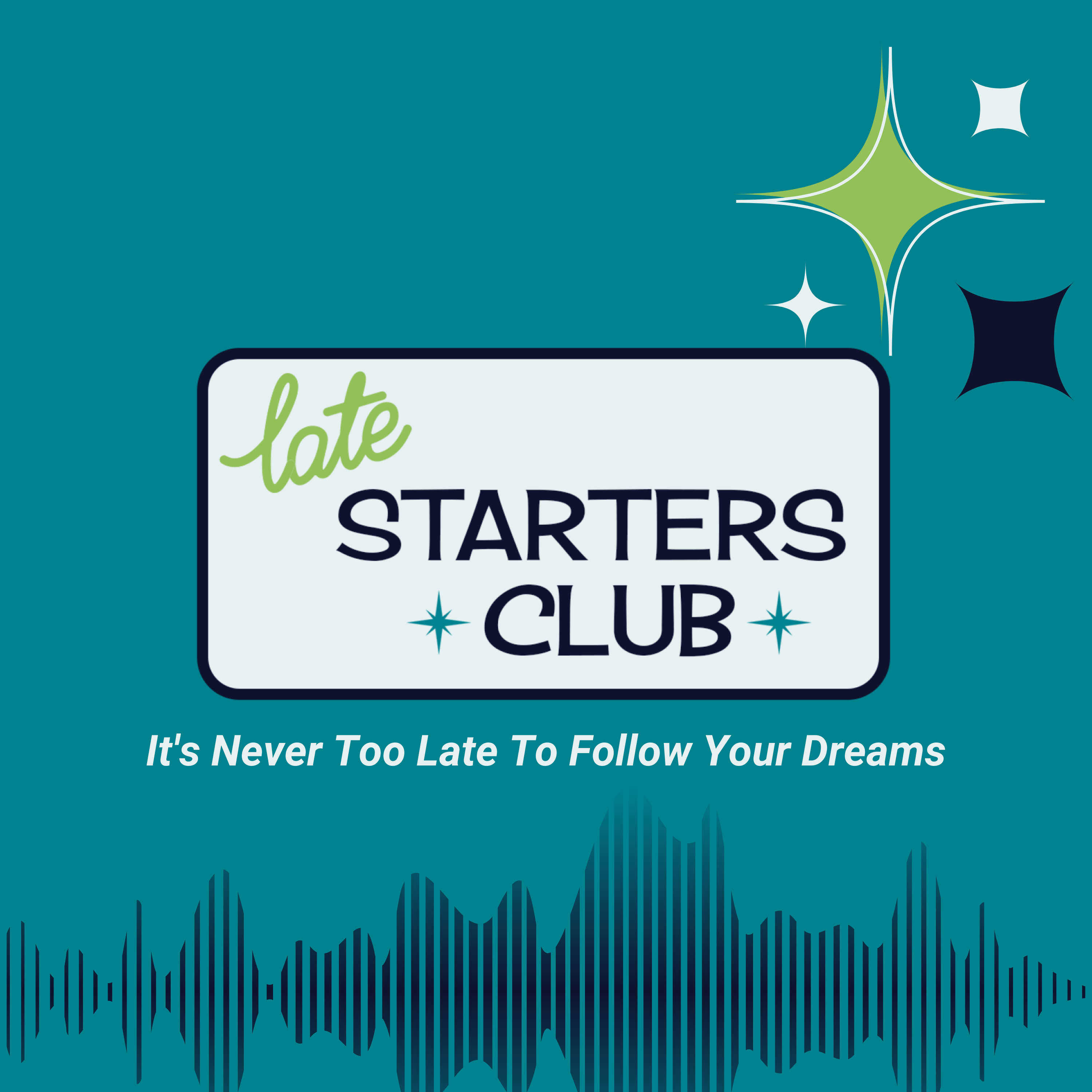
0 Comments